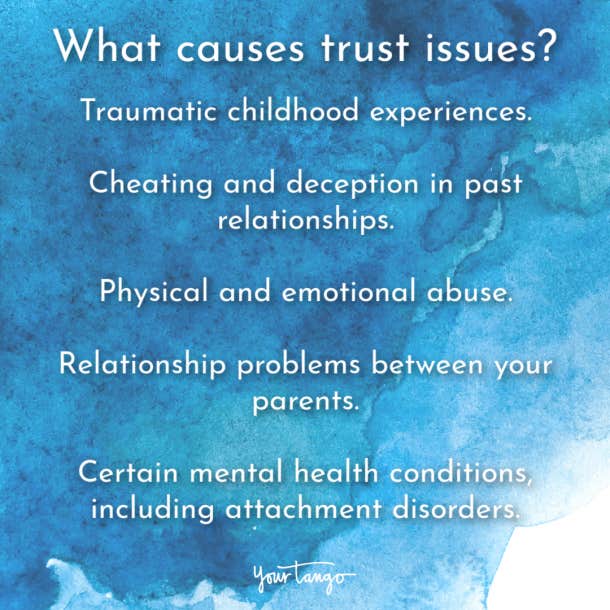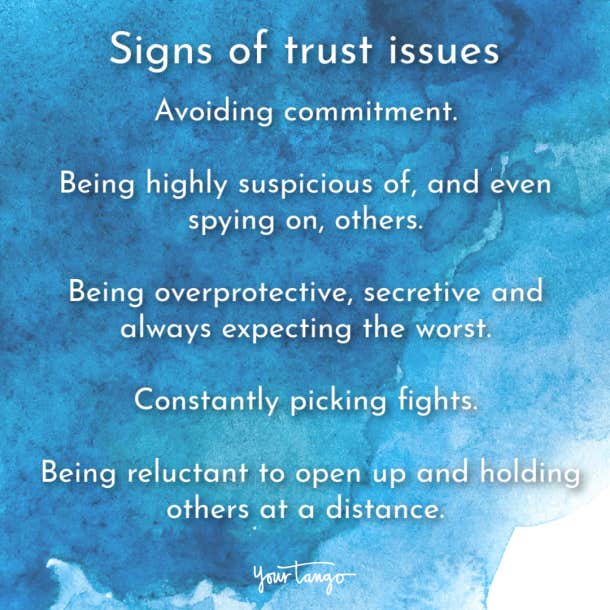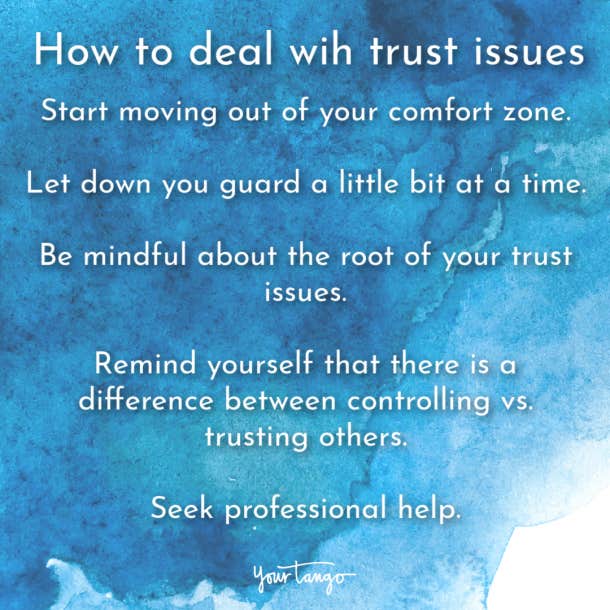Trust is essential to successful relationships, but it can be difficult for us to let go of control and place confidence in someone else, giving them the power to potentially hurt us. Sometimes, you just have to trust that things happen for a reason — as Oprah Winfrey once said, “I trust that everything happens for a reason, even if we are not wise enough to see it.” But for some people, that’s far easier said than done.
What are trust issues?
If you have trust issues, you find it hard to trust people and believe in the general integrity of others. People with trust issues in relationships may often let fear of being hurt or betrayed stand in the way of their happiness. Pervasive lack of trust in a relationship can cause harm to both the person with trust issues and their partner.[1] RELATED: What I Wish I Could Tell The Man Who Broke My Trust
What causes trust issues?
Typically, past experiences in which a person felt unsafe or threatened are what lead to the development of trust issues. These kinds of experiences or situations can take many forms, including the following:
1. Traumatic childhood experiences.
Trust issues can stem from traumatic experiences you encountered as a child. For example, if you grew up with parents who lied to you or neglected you, you may have developed trust issues over the years. According to Keya Murthy, a clinical hypnotherapist and spiritual life coach, this goes hand-in-hand with self-esteem issues. “It’s directly related to low self-esteem, what you heard and saw growing up, and past relationships,” Murthy explains. “Trauma and abuse make it worse and without deep healing, it is nearly impossible to overcome and begin trusting again.” And there’s scientific data behind what Murthy tells us about the strong relationship between a lack of self-esteem and interpersonal trust issues.[2]
2. Cheating and deception in past relationships.
If a former partner in a romantic relationship was manipulative, cheated on you, or lied to you throughout your relationship, you could develop trust issues. Repeated instances of broken trust compound matters. The more trust is broken, the more that lack of trust grows with time.
3. Physical and emotional abuse.
Physical abuse and other forms of mistreatment from family members, previous partners, or others who were close to you may lead to trust issues in your present relationships. If you were bullied as a child or teen, abused, or betrayed by anyone, this could contribute to trust issues you face now, including fears of rejection and other social anxiety-related difficulties.[3]
4. Relationship problems between your parents.
Trust issues can result from observing constant battles between your parents, who may have had a tumultuous or unhealthy relationship with each other. Perhaps they ended their marriage in divorce.[4] These experiences during your formative years could lead you to be suspicious of romantic relationships, not know how to have healthy ones, and have a tendency to always keep your guard up later on in life.[5]
5. Certain mental health conditions, including attachment disorders.
Trust issues can also be associated with mental health conditions[6] such as depression, anxiety, post-traumatic stress disorder (PTSD), schizophrenia, and attachment issues. If you have trust issues, there is a chance you may also experience harmful thoughts, actions, or emotions like suspicion and jealousy. These may contribute to developing unhealthy coping mechanisms. All of these have the potential to take root and impact your day-to-day life, causing you serious problems at home, work, and otherwise.
RELATED: There’s Only One Thing More Important Than Love In Relationships — How To Make Sure You Have It
Signs of trust issues
1. Avoiding commitment.
People with trust issues often find it hard to commit to someone, either in a friendship or a relationship, because of the fear of getting hurt. This fear comes from difficulty trusting and opening up to other people, along with anxiety at the thought of being overexposed. You may assume the worst in people and believe that you’re going to get hurt, and in turn, your fears may not allow you to have a happy and fulfilling relationship.
2. Being highly suspicious of, and even spying on, others.
Being so suspicious you frequently snoop on others is another sign of trust issues.[7] “If you trust your partner, family member, or friend, you would not be suspicious,” says relationship coach Ronnie Ann Ryan. “Constantly checking their social media, looking through their phone, poking in their bureau or desk draws, etc. is not part of a healthy relationship.” This is a result of negative assumptions about other people, and a coping mechanism you may have developed to support your feelings of distrust. “If you feel someone is hiding something, this could be your intuition, and the best step to take is to address this directly with the person,” Ryan suggests. “However, if you continue to bring up your concerns and snoop over and over, you are showing that person you do not trust them which can not only be tiresome, but hurtful and demoralizing. This could definitely ruin your relationship, especially if your suspicions are unfounded.”
3. Being overprotective, secretive and always expecting the worst.
If your trust was betrayed in the past, there’s a higher chance that you are even more protective of your heart. You might experience feelings of mistrust when meeting new people, and you become more and more secretive. You may not want to give someone else information about yourself that you haven’t told many others because you fear they will use that information to harm you or ditch you, leaving you feeling empty inside. This may also mean you are scared to be yourself with others, leading you to be so protective and secretive that even if you meet someone promising, you won’t give them a chance to meet the real you.
4. Constantly picking fights.
When you have trust issues, it can be hard to get to know someone and learn about their past, as you will overanalyze and perhaps jump to assumptions in an effort to protect yourself from anything you find threatening. If you discover something that you perceive as a red flag, you may pick fights as a way to keep this person, and the perceived threat, at arm’s length at all times. This could happen if you have trust issues and enter a relationship with someone you know cheated on their ex. You might think, “Once a cheater, always a cheater.” However, people can — and do — change. You may also constantly bicker about how you aren’t willing to share more personal information and let your guard down with your partner. They might feel as though they are giving all of the emotional effort in the relationships and not receiving anything in return. In healthy relationships, each partner can discuss their issues in productive conversations without resorting to picking fights.
5. Being reluctant to open up and holding others at a distance.
Your trust issues may have burdened you to the extent that you now find it hard — and even sometimes impossible — to open up to most people. This may cause friction between you and others, as they might get frustrated with you because they are trying to get to know you and feel you aren’t reciprocating. This won’t help you, unfortunately. If you are preoccupied with problems at work or perhaps a family member, you won’t be able to allow yourself to be vulnerable and let them know what’s wrong. Then, they can’t help or change the issue or situation. This is a double-edged sword, as your partner may sense your inability to open up and feel uncomfortable allowing themselves the opportunity to be vulnerable around you as well. As a result, your relationship may lack empathy, compassion, and the chance to develop a deeper connection.
RELATED: 5 Little Signs You Can Trust Someone Completely
How to deal with trust issues
1. Start moving out of your comfort zone.
Even if you’re only able to take baby steps, this will help you establish a foundation for rebuilding trust. Try having a more intimate conversation with a close friend or family member to tell them if you had a bad day and are feeling down. You just might find that opening up just that little bit to allow them the opportunity to express their sympathy and understanding will cheer you up and make you feel better about trying to open up a little more the next time you have a conversation with them.
2. Let down your guard a little bit at a time.
Vulnerability doesn’t have to mean overexposure. Sometimes, it means showing a more caring, compassionate side to those you’re close to. Letting down your guard isn’t just about being able to express your inner thoughts and feelings — it’s also about letting others in so they can express theirs and you can both deepen your connection with one another. If your partner seems upset about something, gently offer to lend an ear or a shoulder to cry on if they need it. They will appreciate that you gave them the chance to let down their guard and talk out whatever is bothering them. You don’t have to solve the situation. Try just listening and making sure to let them know you care about them with a hug or a few words of encouragement. RELATED: You’re Not Ready For A Relationship Until You Can Do These 5 Things
3. Be mindful about the root of your trust issues.
Sometimes, one of the best ways to overcome a challenge is to confront it. Be honest with yourself and consider what may have caused your trust issues. You can begin to fix your trust issues by recognizing that you have them and acknowledging any other complicating factors, such as anxiety or depression. Try taking time to journal every day, explore meditation, or simply set aside some time to yourself to look inward and contemplate any experiences you may have faced in your past that could explain your difficulty with trusting others now. Be open-minded, allow yourself to feel any emotions that may arise, and be gentle with yourself. Remember that, like building trust, this will take time. But the strength it gives you to rebuild your trust will be worthwhile.
4. Remind yourself that there is a difference between controlling vs. trusting others.
Attempting to control situations or other people isn’t the same thing as bestowing your trust upon them. Rebuilding trust does involve taking some risks, but they are intentional, thoughtful risks that you have the power to draw your own boundaries around. Trusting others doesn’t mean surrendering yourself to the susceptibility of being hurt by others, but you will have to be able to tolerate some level of vulnerability. That’s OK. That makes you a human, just like everyone else. Many people have small circles of trust that include their closest friends and family members. While you are taking baby steps, remember that you don’t have an endless journey ahead. You may also have a small circle, and you can trust those who are there for you along the way. Try your best to be patient with them — and yourself.
5. Seek professional help.
If trust issues are taking a toll on your relationship and/or your ability to function in your daily life, you might want to consider seeking professional help to resolve the root of your obstacles with trust. With the help of a qualified mental health professional, you may have a greater chance of tackling your trust issues.
As the great essayist Ralph Waldo Emerson said, “Self-trust is the first secret of success.” “Remember, what you look for, you will always find. Look for reasons to trust, rather than excuses to mistrust. Wherever your attention goes, that’s what will follow. So, put your attention on the positive and you will have more of it,” says Murthy. RELATED: 5 Powerful Types Of Trust Every Relationship Needs If You Want It To Last Megan Hatch is a writer who covers news and entertainment, love and relationships, and internet culture.
7 Sources


